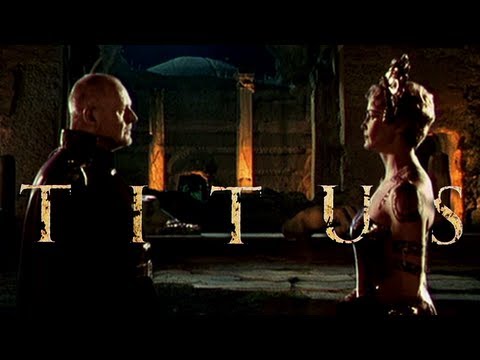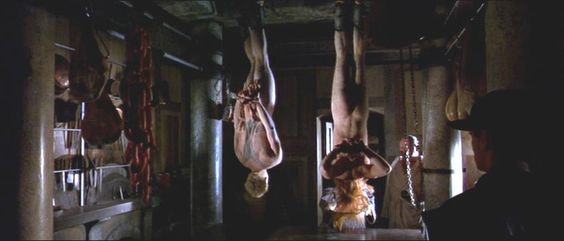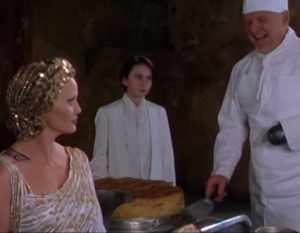Titus Andronicus: Vengeance At A Cost
Never mess with the power of revenge because you will not receive justice. Revenge is an act that is embodied within the soul that you have access to. Wanting to use this element is not suggested because once you use it, it turns into an endless cycle. A great example of how this aspect is used and how there is no solution can be illustrated through the play of Titus Andronicus. This play is a revenge tragedy by William Shakespeare. Revenge tragedies usually consist of bloody retribution and became very well liked in the 16th century. Revenge is not sweet, nor a form of prosperity, at least in this play. To seek for revenge is to seek out for harm on someone or something. Revenge is intended to cause destruction on someone’s life or anything. When revenge is in play between two people, there is a constant going back and forth that causes revenge to become nothing but an endless cycle. This can be seen through the actions of Titus and Tamora as they go back and forth inflicting pain on one another.

Justice is all about there being a final settlement with fairness. There is an element of equity that one is seeking and he or she is satisfied with. Titus and Tamora propose revenge on each other more than once and that illustrates that neither he nor she has reached fairness. The problem here is that they never will because revenge never stops giving. In this case, justice is not served for Titus nor Tamora because they all die at the end and there is no one left.
What causes the revenge between Titus and Tamora is emulation. Emulation is an element that is used to imitate an action, but outdo that action. Titus kills Tamora’s son; therefore, Tamora is going to do the same to Titus, but even worse, and that starts the cycle of revenge between the two. Tamora is using emulation as a form of retribution on Titus for what he has done to her son. This play is a study of revenge in which emulation shows us this endless cycle with justice being unserved. It depicts the cycle of violence and how the only way for it to end is by leaving no one standing, but dead. Death in these circumstances is seen as a negative connotation and not an aspect of prosperity that would grant justice for either party.

Emulation and The Three Spectacles
The emulation in the play causes for there to be “three main spectacles of revenge––the sacrifice of Alarbus, the rape of Lavinia followed by the decapitation of Titus’s sons, and the final bloodbath” (Willis 50). The sacrifice of Alarbus is not necessarily an act of revenge, but what makes it so significant is how this “spectacle” begins the chain. Sacrificing Alarbus is just part of Titus’s religious custom:
These are their brethren whom your Goths beheld
Alive and dead, and for their brethren slain
Religiously they ask a sacrifice.
To this your son is marked, and die he must. (Tit. I. I. 122-125)
He did not do this to be spiteful or seek revenge on Alarbus or his family. This was done to allow “Alarbus’s death to represent (and therefore to take the place of) a more bloody and wide-ranging retribution, expiating the debt owed by the Goths to the Roman dead while leaving Tamora’s family injured but surviving and saving Titus’s family from further loses in the pursuit of vengeance” (Hilaire 313). However, this act is not taken lightly at all by his mother, Tamora. Tamora insists that they not sacrifice her son and leave him alone. Titus does not obey her wish and when he is killed she grows very upset.
Emulation takes its course when she decides that she will imitate what Titus has done to her son to him, but far worse and revenge is set to play. Tamora’s emulative action is a form of justice that she seeks for the loss of her son. She does not think it is fair that Titus has sacrificed her son and so she wants justice for the pain he has inflicted on her. When she gets vengeance on Titus, she will feel her justice, but it won’t be for long because “emulation and the rivalry it often engenders is hardly a panacea” (Dickson 101).
The Rape of Lavinia

Tamora was not the only one that was upset with the sacrificing of Alarbus, Chiron and Demetrius were also really upset and declared to join in on their mother’s emulative action towards Titus. At this point, it should not be so difficult for Tamora to get her revenge on Titus because she has more power now since marrying Saturninus, the Roman Emperor. The rape of Lavinia is what Tamora uses as her retribution on Titus for the killing of her son:
Hadst thou in person ne’er offended me
Even for his sake am I pitiless.
Remember, boys, I poured forth tears in vain
To save your brother from the sacrifice,
But fierce Andronicus would not relent.
Therefore away with her, and use her as you will––
The worse to her, the better loved of me. (Tit. II. III. 161-167)
Her son was killed in a torturous and graphic way in which Tamora called the death a “cruel irreligious piety!” (Tit. I. I. 130). These men were going to “hew his limbs and on a pile / Ad manes fratrum sacrifice his flesh” (Tit. I. I. 97-98). Tamora did not like this one bit and so with the rape of Lavinia, she was going to make sure that she got her revenge and gained her justice.
The rape of Lavinia is an imitation of the killing of Alarbus, just different scenario. Titus hurt Tamora’s son, so now Tamora is going to hurt Titus’s daughter. The pain that Titus inflicted on Tamora, Tamora will now inflict it on Titus. With the use of emulation, Tamora will hurt Titus’s daughter far worse and she will inflict more pain on Titus.
Lavinia does not die and Alarbus does, but that doesn’t mean that Tamora didn’t get her revenge or her justice. The imitation does not have to be the exact same thing in order for Tamora to outdo Titus. In order for Tamora to really get back at Titus for what he did, she makes sure that Lavinia is allowed to live so Titus can actually see her suffering, unlike Tamora, she was not allowed to see her son get killed and that eased the pain, but still really hurt her to know that he was getting killed. If Titus sees his own daughter feel the pain, Titus will feel it with her and he will feel far worse than Tamora ever did and that’s what she wants.
They killed her son gruesomely, so now she will have his daughter tortured gruesomely and have her live to feel the pain and suffer. Lavinia is raped twice, one right after the other. Along with that, Lavinia also has her tongue cut out and her hands cut off. She can no longer speak, write, or grab anything. What has been done to her and the condition that she is left in “is a stark visual reminder of the unconscious proximities of sexuality, rape, death, and dismembering on which the play builds” (Willbern 172). She is set free, but in very cruel circumstances to the point where both Chiron and Demetrius make fun of her, and she tries to hide herself before she is seen:
So, now go tell, an if thy tongue can speak,
Who ’twas that cut thy tongue and ravished thee.
Write down thy mind, bewray thy meaning so,
An if thy stumps will let thee play the scribe.
See how with signs and tokens she can scrawl. (Tit. II. IV. 1-5)
By this point, Tamora does feel that she has received justice because she retaliated and Titus has not done anything about it yet. She feels great because she loves that Titus’s daughter was harmed. What was done to Lavinia was very similar to what they did to Alarbus. When they killed Alarbus, they cut off his limbs and as for Lavinia; it was her hands and tongue. Tamora was able to outdo Titus because Lavinia was allowed to live in order for there to be more suffrage. On top of that, her ability to speak was taken away and she was forcefully raped. Lavinia was tortured and she was tortured horrifically. One would rather die than go through this and Lavinia begs for that instead: “O Tamora, be called a gentle queen / And with thine own hands kill me in this place / For ’tis not the life that I have begged so long” (Tit. II. III. 168-170).
Just like Tamora begged for her son to not be killed, she was able to get Lavinia to also beg for this to not happen to her. Tamora was humiliated by the fact that she had to beg for her son to not be sacrificed. She had to get on her knees to beg for this to not happen. She wants Lavinia to feel the humiliation that she felt, and this humiliation that Tamora felt is part of what led her to use emulation and revenge on Titus. Just like Deborah Willis puts it, “Tamora’s grief was seemingly transformed in an instant into a desire for revenge by the humiliating experience of being forced to ‘kneel in the streets’ and plead ‘in vain’ for her son’s life” (46).
Tamora got her revenge through Lavinia. She never did anything wrong to Tamora, but Alarbus also did nothing wrong to Titus. Her emulative action worked up to this point, but is it all over?
Decapitated
Indeed, her revenge on Titus is still not over. Chiron and Demetrius have already done more than enough with Lavinia, but why not keep going? Part of this revenge was to also frame both Quintus and Martius for the death of Bassianus. That is going to an extreme of outdoing what Titus has done to this family by taking Alarbus away from them, but this is what they want. This family wants to make sure that they really surpass the actions of Titus. Bassianus is killed, but both brothers are blamed for his death and Saturninus grows really upset over this because Bassianus is his brother. This then gets Saturninus to use emulation on both brothers for their actions. Saturninus now seeks revenge and makes sure that both brothers are killed, which happens.
Quintus and Martius have done absolutely nothing wrong, but because they were framed, they both get decapitated. To make matters worse, Titus is told that if he, Lucius, or Marcus cut off one of their hands and send it to the king, Quintus and Martius will be set free and alive. This however was a complete lie, but Titus listens because he wants his sons to be okay and so he sacrifices his hand. His hand is cut off and this “immediately gives up the martial prowess that seemed the hand’s essential feature” (Rowe 286).
When he sacrificed his hand, he gave up some of his power and that was the goal with this action. Through the use of emulation, Tamora was able to have Lavinia tortured, Quintus and Martius killed, and the hand of Titus cut off. The hand of Titus was a form of sacrifice and as part of the revenge; some sacrifice was needed just like Alarbus was sacrificed. That is what emulation does, emulation is a mere form of imitation with the process of outdoing what is being imitated and Tamora succeeded in that, but not for long because all these situations really hurt Titus. Titus by this point is now going to use emulation to get his revenge on Tamora for what has happened to himself, Lavinia, and his sons.
Revenge, Rape, and Murder
It is officially now Titus’s turn to take over and begin his revenge. Titus by this point has gone insane because of everything that has happened, but he has a plan and is ready to use it to his advantage. Titus gets to put his plan into action when Tamora, Chiron, and Demetrius go over disguised as Revenge, Rape, and Murder. When Tamora leaves, Titus gets Chiron and Demetrius to stay and that is when he gets the chance to kill both of them. He expresses how he feels about what they have done to him and his family:
You killed her husband, and for that vile fault
Two of her brothers were condemned to death,
My hand cut off and made a merry jest,
Both her sweet hands, her tongue, and that more dear
Than hands or tongue, her spotless chastity,
Inhuman traitors, you constrained and forced. (Tit. V. II. 171-176)

Titus has had enough and feels no sympathy towards them for what he is about to do to them. He is going to make sure that now he really outdoes what this family has done to his. Titus cuts Chiron and Demetrius’s throats, which kills them. He is getting the chance to cook at the banquet, so he is going to cook both Chiron and Demetrius in order to feed both of them to their mother. What a better way to outdo Tamora and get his revenge than to not only have her sons killed, but watch her eat them.
The Bloodbath
The final bloodbath at the end of the play is highly detrimental. Titus kills his own daughter because she is damaged and Saturninus suggests the action: “Because the girl should not survive her shame / And by her presence still renew his sorrows.” (Tit. V. III. 40-41). Titus physically kills his daughter, but he tells Saturninus that he is not the one who really killed her, it was Chiron and Demetrius. They killed her when they were seeking their revenge on Titus because they damaged her in so many ways.
A few moments after Titus kills Lavinia, Saturninus asks for Chiron and Demetrius, but they cannot come out because they are the food that everyone is eating. When this is revealed, Titus decides to kill Tamora to really outdo what she has done to his family. Taking the whole family out would surpass Tamora’s actions on Titus’s family. Then instantly, Saturninus imitates Titus’s action of killing his wife, and kills Titus as revenge for killing his Empress.

Instantly after this happens, Lucius uses emulation to get his revenge on Saturninus for killing his father and he kills Saturninus. By this point, everyone is dead and Lucius is the only one left. Everyone uses emulation and power in the play to find their justice that they are seeking, and the play illustrates how a “link between emulation and power is further emphasized in the many patterns of emulative revenge, the patterning of seeking self-justified, self imposed empowerment through precedents of personal revenge-taking” (Dickson 381).
Emulation is the cause of revenge because it keeps everyone trying to outdo each other and that keeps the revenge pattern going. Emulation can be difficult to understand at times, but as Vernon Guy Dickson puts it, “Emulation is a conflicted term that embraces imitative and mimetic practices, but also emphasizes difference and potential rivalry within these practices” (377).
Titus and Tamora keep inflicting pain on one another, but neither is satisfied with how much pain is being given to the other. Tamora wants Titus to hurt more than her, but then Titus wants Tamora to hurt more than him. Trying to surpass one another’s hurtful actions on each other forms a pattern of revenge that will never end until they are all dead. In this case, that is exactly what happens. Everyone dies and there is no one left to continue emulating the revenge sequence. This is bound to happen when emulation is used because it “means striving to go beyond in a broad variety of ways, while retaining some resemblance, some lifeline or link, with what has been done before” (Dickson 172).
Both Titus and Tamora really tried to strive beyond each other in their retaliations and it killed them. Revenge doesn’t get you anywhere and it sure didn’t get anyone anywhere in this play, but to his or her deathbed. When you seek revenge, you are seeking payback for being wronged and it never leads to anything good because retaliation is always a part of it. Just like Tamora and Titus, both of them kept retaliating on each other and it demonstrates how it continues, and there is no stop until someone is badly hurt or in this case dead.
As for justice, fairness plays a role in that. You have justice if you feel like there has been a form of righteousness. In Titus Andronicus, justice is not served at all because there is no one left standing. Everyone dies and no one felt as if their justice was served because they kept digging for it to their deaths. Emulation was the cause of all of this because Titus and Tamora kept trying to surpass each other’s actions. They were imitating each other, but making sure that they outdo one another.
This would never serve them justice because they would never be satisfied enough and revenge would keep playing its role. With emulation in play, nothing would ever be good enough. All of this destroys the society and takes out some of the most important people in Rome. Saturninus was the Emperor and Tamora was his Empress, now they are dead. Titus was the General of Rome and now he is dead. It put Rome in a very bad predicament. Lucius does become the Emperor at the end, but still it left Rome in a bad standing because of everything that happened. Emulation took everyone out in the final bloodbath scene.
Works Cited
Dickson, Vernon Guy. “‘A Pattern, Precedent, and Lively Warrant:’ Emulation, Rhetoric, and Cruel Propriety in Titus Andronicus.” Renaissance Quarterly 62.2 (2009): 376-409. Academic Search Complete. Web. 1 February 2016.
Dickson, Vernon Guy. Studies in Performance and Early Modern Drama: Emulation on the Shakespearean Stage. Farnham, GBR: Ashgate Publishing Group, 2013. eBook.
Hilaire, Danielle A. St. “Allusion and Sacrifice in Titus Andronicus.” SEL Studies in English Literature 1500-1900 49.2 (2009): 311-331. Project MUSE. Web. 1 February 2016.
Rowe, Katherine A. “Dismembering and Forgetting in Titus Andronicus.” Shakespeare Quarterly 45.3 (1994): 279-303. JSTOR. Web. 1 February 2016.
Shakespeare, William. Titus Andronicus. The Norton Shakespeare, Vol. 1: Early Plays and Poems. 2nd ed. Gen. ed. Stephen Greenblatt. New York and London: W. W. Norton, 2008. 399-463. Print.
Willbern, David. “Rape and Revenge in Titus Andronicus.” English Literary Renaissance 8.2 (1978): 159–182. JSTOR. Web. 6 February 2016.
Willis, Deborah. “‘The Gnawing Vulture:’ Revenge, Trauma, Theory, and Titus Andronicus.” Shakespeare Quarterly 53.1 (2002): 21-52. Project MUSE. Web. 6 February 2016.
What do you think? Leave a comment.











Interesting read. I like your take on how justice and revenge can never outdo one another and create a cycle that leaves no one satisfied. One thing I would have liked to be addressed in this article is, are there examples of situations where revenge is an accepted form of culture in Titus. While the message is clear here and in the play/film itself, but to what degree is there a social and cultural justification for revenge? A great read overall.
I always have a hard time believing that this is truly a Shakespeare play becauseno other Shakespeare play is as brutally violent and as sadistic as this one.
The best version of the Lavinia scene I have seen is the film version (with Anthony Hopkins as Titus), where she turns to the camera and a red ribbon comes out of her mouth. Not gory but very effective and also strangely haunting.
I agree, they really captured the essence of the scene!
Who can surpass Anthony Hopkins as Titus – absolutely agreed!
Great work on this article. It does well at outlining the destructive cycle of revenge between two violent parental figures. (Three, if you count Aaron.)
I was unfamiliar with Titus Andronicus before reading this article, so I did a little research. Apparently there is some controversy whether William Shakespeare did, in fact, write this.
I read arguments on both sides, and I don’t know if he wrote it or not. If he did, it was his first attempt at tragedy. It’s incredibly violent, and not terribly well-written. It’s definitely an interesting work of drama.
My professor likes to refer to this play as Shakespeare’s “slasher film,” and I’d say that’s pretty fitting.
I love demented plays in which all the beautiful poetry is put into the mouths of the villains.
I can understand why it’s not one of Shakespeare’s top plays–it’d be difficult to reproduce on-stage (and violent).
I love myself a little Titus.
I came to my love of Shakespeare a little late. I was raised on rodeos, not theater, and I had never bothered with plays because I figured I would not understand them, so I waited until I was forced to take a survey of Shakespeare plays in college. Thanks to a wonderful professor, I can now say that I love Shakespeare as much as the next guy of middling intellect.
I’m going to come out and say it: the Roman plays are the best plays.
So in-your-face!
It’s interesting to get into early Shakespeare and see in what ways he conforms to and subverts the beaten-to-death-in-the-most-bloody-way-possible genre of the revenge tragedy.
Love this play!
Titus Andronicus would likely appeal more to contemporary audiences than to those of the past three centuries or so.
I loved this play. Shocking, gripping and darkly comic.
This is by far one of my favorite Shakespeare plays. I actually watched the movie but I am considering reading the play.
It’s a really violent play, yet strangely fascinating.
Finished this powerful play this past weekend and was extremely moved.
Good article! This is one Shakespearean play I have never read. But I will now.
I think you focused on narrative of the revenge scenes more than analysis of them. I would have enjoyed much more if it had been a compare and contrast article about 2 revenge plays from Shakespeare’s works.
I saw the Peter Brook production when it came to the cavernous and long gone Stoll Theatre on Kingsway. Totally mesmerising and unforgetable with a towering performance from Olivier. What a genius Brook was/is in his illumination of so many great plays,and even such not great plays that I recall lighting up my early theatregoing like The Little Hut and Colombe.
The emulative patterns existent in Titus are definitely characteristic of revenge situations in general and are also significant in the way in which the nature of revenge causes the person seeking the revenge to be debased and lowered to the level of the person they’re seeking revenge against. Though I wouldn’t say that ’emulation is the cause of revenge’. Revenge rather seems to result from a desire, however misguided, to pursue justice on your own terms, and outside the framework of civil justice etc.; on terms which cannot operate on the basis of absolute or objective terms and which are thus not only ethically problematic but also, as you point out, cannot have an end (apart from complete destruction), as the actions aren’t regulated by an external body.
This was a dark story centered around a vicious cycle wherein each side attempted to exceed the pales of emulation so as not to be emulatable. The way to win was to do that which could not be emulated: to upstage, outface and outdo by resorting to the most morbid and macabre expressions imaginable in an attempt to demoralize the opponent so they could no longer resolve the will necessary to retaliate. This immoral imperative was carried out by exacting in extremis exactions in the hopes that the opponent would become so utterly demoralized so as to forfeit the inhumane competition out of sheer exasperation. The tactic used was to affect the sensibilities of the opponent beyond all sense, which also served as a proxy for keeping score. Upping the ante without paying heed to cost fueled a race to the bottom, which was predicated on a war-of-attrition that emulated a pyrrhic victory stratagem to an unsustainable and pernicious extreme.
i am very much impressed.thank you